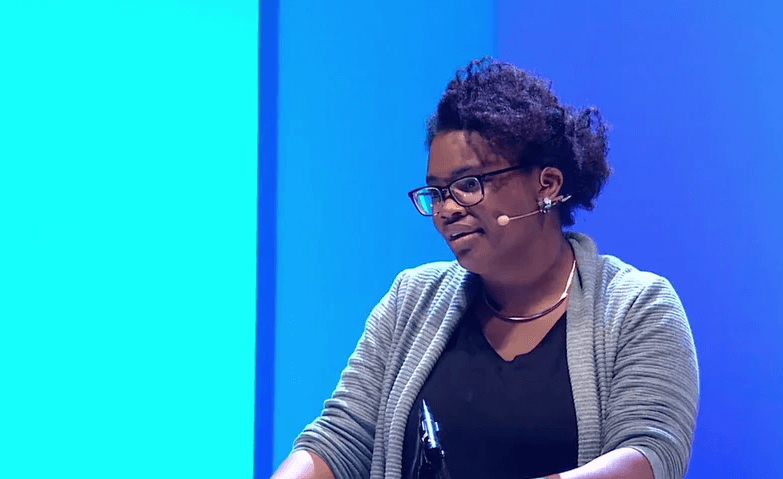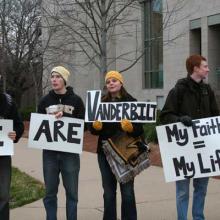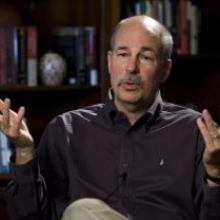InterVarsity
When we started questing the bible, everything falls apart. What can we even trust or believe in? But I think the second fear is that it will drive a wedge between us and this community that is really important to us especially as Asian Americans because we’re a super community oriented culture. So I think that a lot of Asian American Christians are afraid to do that and I think for legitimate reasons. Those fears are not unwarranted.
American evangelicals hold their theological and social views with deep conviction. We tend to add a layer of moral certitude to our positions. This can sometimes be helpful in the struggle for justice. But if every issue becomes the social or theological hill we choose to die on (or to kill on), then there are too many of us killing or dying on too many hills.
In part, this dogmatic tendency stems from the evangelical belief in absolute truth. In a world gone radically relativistic, this belief is a good thing. But when these convictions are challenged, it can feel like an assault against universal truth itself. We may fear that if one of our beliefs needs correction, then our presupposition about any truths that transcend time and culture are at risk.
I looked around, and saw a collective of emerging disciples, evangelists, healers, teachers, artists, prophets, and peace warriors who loved God with all their hearts and earnestly longed for something new. Holding our own and each other’s wounds, I saw tears of lament that water the earth. I saw a community of spiritual orphans in exile, holding onto Christ while healing each other.
For some Christians, support for the Black Lives Matter movement is a no-brainer. After all, Jesus opposed violence, opposed the taking of life and opposed racial distinctions. As the apostle Paul taught in his letter to the Galatians, there is neither slave nor free, for “you are all one in Christ Jesus.”
A broken church: quick to condemn, fear, and divide, and slow to love, seek justice, and unify.
But evangelical leaders are stepping forward. They are voicing support for the structural and systemic protection of the image of God in black people. And as in the days of MLK and Mandela, it is essential that allies understand the movement and its operating principles.
The Black Lives Matter movement is the most recent phase of the 500-year global struggle for black freedom. It is not random. It is not disorganized.

Michelle Higgins. Image via Urbana/RNS
Michelle Higgins has been making waves lately. A leader in the #BlackLivesMatter movement, she recently addressed a gathering of 16,000 evangelical students at an InterVarsity conference in St. Louis, during which she urged them to back the movement.
No … Obama’s not taking your guns.
2. Sandra Bland’s Family: Trooper Perjury Charge a ‘Slap on the Wrist’
"Where is the indictment for the assault, the battery, the false arrest?"
3. Open Letter to the Leadership of #Urbana15 and InterVarsity Christian Fellowship
Add your voice to the growing list of people of faith saying “thank you!” to InterVarsity for supporting Black Lives Matter.

Several hundred activists gathered in Union Square in New York City for a candlelight vigil in memory of Sandra Bland on Dec. 30. a katz / Shutterstock.com
To put this in a religious context: overcoming the divisions of race has been central to the church since its beginning, and the dynamic diversity of the body of Christ is one of the most powerful forces in the global church. Our Christian faith stands fundamentally opposed to racism in all its forms, which contradict the good news of the gospel. The ultimate answer to the question of race is our identity as children of God, which we so easily forget applies to all of us. And the political and economic problems of race are ultimately rooted in a theological problem. The churches have too often “baptized” us into our racial divisions, instead of understanding how our authentic baptism unites us above and beyond our racial identities.
Do we believe what we say about the unity of “the body of Christ” or not?
I, along with my colleagues Leroy Barber, Dominique D. Gilliard, Mae Cannon, Micky Jones, Dr. Soong-Chan Rah, and Dr. Brian Bantum, were struck that InterVarsity had made a bold and unique move among modern evangelical non-advocacy-based parachurch organizations. I served on staff with InterVarsity for 10 years from 1995-2005. For five of those years, I served as director of racial reconciliation in Greater Los Angeles. In my last year, I served as racial reconciliation specialist for Southern California. In all those years, most of the organization’s focus was on the reconciliation of cultures within their own communities. In some instances, InterVarsity even dared to address the structural and systemic injustices within its own organization. Occasionally, a campus chapter would respond to a racist incident that occurred on campus. But never before had InterVarsity issued a public statement in support of structural and systemic racial justice in the broader society.
It was 1987. I walked across Rutgers University campus with another freshman friend. We were on our way to a meeting for Campus Crusade for Christ (now Cru). In the gobs of our gab we happened upon the topic of the recent scandalous departure of Intervarsity Christian Fellowship president, Gordon McDonald. Interim President, Tom Dunkerton, guided the organization for the next year, appointing Dr. Samuel Barkat as first VP of Multiethnic Ministries. Soon after, Dr. Steve Hayner would accept the mantle of president of the troubled organization. Over the next 13 years, Hayner guided Intervarsity into a period of stability, growth, and racial healing.
Perhaps the most significant contribution of Hayner’s leadership was his close partnership with Dr. Barkat. Together they stood on the sovereign foundations of Intervarsity’s historic struggles toward racial righteousness and guided the organization through a deep examination of its multiethnic dynamics and its white dominant culture. Ultimately, their work led the parachurch collegiate ministry through a transformative examination of its own white western cultural lens and how that lens shaped their understanding of Jesus and the gospel.
Is the pope Catholic? Is the president of the Christian student club Christian?
These questions might seem equal in their wry obviousness. They’re not. In the massive California State University system, as at some other universities, new anti-discrimination rules for student groups mean it can no longer be required that the president of the Christian student fellowship is Christian, or that the head of the Muslim association is Muslim, or that the officers of any group buy into the interests and commitments of that group.
Student clubs that refuse to accept the new rules will find themselves on the sidelines when it comes to meeting space, recruitment opportunities and other valuable perks that go with being an officially recognized group.
Such is the fate that has befallen InterVarsity Christian Fellowship, a national campus ministry that finds itself “derecognized” in the 450,000-student Cal State system for insisting that student leaders of its campus chapters affirm the basic tenets of evangelical belief.
AT THE URBANA student missions conference in December 2000, three Indigenous leaders who are also evangelicals were introduced to key members of the leadership of InterVarsity Christian Fellowship. Richard Twiss (Rosebud Lakota/Sioux), Terry LeBlanc (Mi’kmaq), and Ray Aldred (Swan River Cree) sat down with InterVarsity leaders and began to share their stories. InterVarsity leaders started to ask questions about culture and faith and evangelism and contextualization.
Soon they found that these leaders had a fresh word for the entire movement in its struggle to become a racially reconciling movement. Other elders joined the three: Randy Woodley, Bryan Brightcloud, Cheryl Bear-Barnetson, and Melanie McCoy. In the course of a series of conversations, the question of land use and protocol came up.
The elders explained: All cultures, including Indigenous cultures, have protocols—particular ways of doing things. Some of the most significant protocols in Indigenous cultures are connected to the use of land. The InterVarsity staff adopted the posture of students and, in humility, submitted to the teachings of these elders of several nations that were on this land thousands of years before Europeans ever “discovered” it.
The elders called their attention to Acts 17:26-27: “From one ancestor he made all nations to inhabit the whole Earth, and he allotted the times of their existence and the boundaries of the places where they would live, so that they would search for God and perhaps grope for him and find him—though indeed he is not far from each one of us.”
When the Supreme Court ruled that a Christian student group could only be recognized at a small public law school if it accepted non-Christians and gays as potential leaders, some lawyers and campus advocates grew nervous.
While the 5-4 decision in Christian Legal Society v. Martinez was primarily aimed at public colleges and universities, some conservatives say the decision has upended university religious life, with both public and private schools reconsidering nondiscrimination rules.
Now, nearly two years after the decision involving the University of California's Hastings College of the Law, the case is causing strife across U.S. college campuses.
A letter from Alec Hill, President of InterVarsity Christian Fellowship/USA to Intervarsity Staff
I’m upset.
Last month, the Federal government mandated that Catholic universities, hospitals and charities must provide – and pay for – contraceptives to their employees and students. The mandate may also — depending upon interpretation – include the provision of sterilization services and the morning-after pill. (There appears to be some disagreement amongst scholars regarding the potential scope of the new Health and Human Service mandate.)
Why should I care? I am not Catholic. Nor do I agree with Catholic teaching on contraception, though I do have grave concerns about the morning-after pill.
Politically, I am a moderate and hence not prone to condemn every governmental edict.
I care because this matter touches upon the religious freedom of us all. I care because InterVarsity is engaged in a parallel struggle. Over the past 18 months, our status as a recognized student organization has been challenged on 41 campuses.











